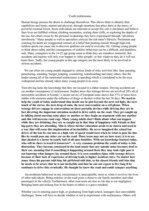-
Youth Recklessness
Inconsiderate behaviour in any circumstance is unacceptable, more so when it involves the lives of other individuals. Being reckless on the road poses a threat to our family members and other passengers in the vehicle. Furthermore, other road users are also at risk due to our negligence. Bringing harm and striking fear in the hearts of others is a grave misdeed.
Whether you’re entering junior high, or graduating from high school, teenagers face unavoidable challenges. Some will have to decide whether or not to experiment with recklessness. Others will have to escape pressures. Some will have to restrain the urge to drink, or drive uncontrollably. These problems are timeless and will most likely remain as such. But with a little support, and the survival instinct of all adolescents, teens can conquer recklessness.
…
Human beings possess the desire to challenge themselves. This allows them to identify their capabilities and limits, mental and physical, through situations that place them at the mercy of powerful external forces. Some individuals are reluctant to accept this call to adventure and believe their lives are fulfilled without climbing mountains, scaling sheer cliffs, or exploring the depths of the sea, but others swear by the personal awakenings they have experienced through "adventure enrichment." Many people as well as specialists criticize the risk-taker's lifestyle. Pessimism and yearning for death are exaggerated censure of a belief that pushing oneself through high-risk, outdoor sports can cause one to discover qualities not used in everyday life. Getting young people to think about safety and the consequences of reckless behaviour can be a difficult, and thankless, task. Many youngsters in the 16-25 age group seem to think they are somehow immortal; that accidents and injuries will only ever happen to 'other people'; or that whatever they do it will not harm them. Sadly, but young people in this age category are the most likely to be involved in serious accidents.



